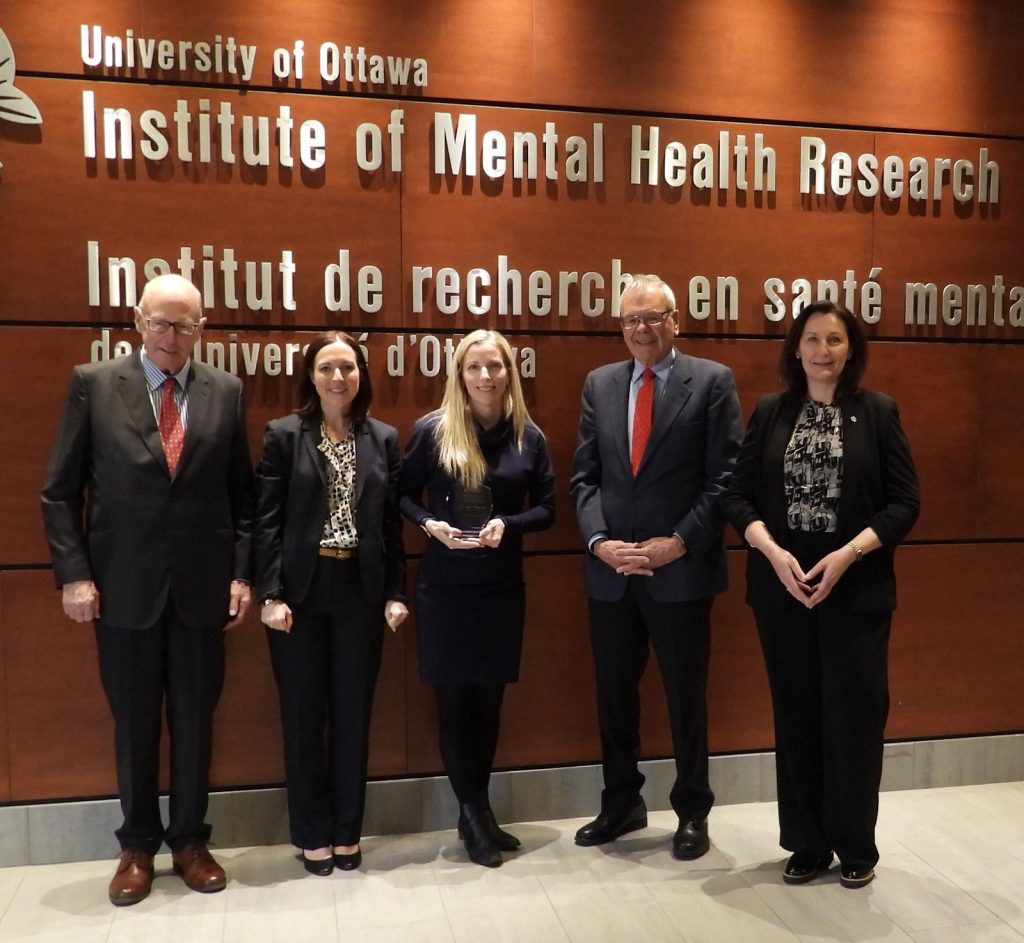Dr. Sheri Madigan wins eighth annual Royal-Mach-Gaensslen Prize

The 2022 Royal-Mach-Gaensslen Prize ceremony took place 5 December 2022, at the University of Ottawa Institute of Mental Health Research at the Royal. Left to right: Mach-Gaensslen Foundation treasurer Richard Hofer, the Royal president and CEO Joanne Bezzubetz, University of Calgary professor Sheri Madigan, Mach-Gaensslen Foundation chair Christopher Carruthers, and Institute of Mental Health Research president Florence Dzierszinski.
“When kids are on screens for far too long, research shows they are not meeting their developmental milestones,” explains Dr. Sheri Madigan, a clinical psychologist, professor, and Canada Research Chair in the Department of Psychology at the University of Calgary and the Alberta Children’s Hospital Research Institute. When asked whether family time, such as around the dinner table, is important, she emphasizes that it’s not just the dinner but device-free dinners where families can interact with each other that help children’s mental health. Her advice: “Disconnect to connect.”
But she’s not advocating cutting off social media entirely. She says young people need their digital communication with peer networks, but this must be balanced with real-life human connections. “Youth who have no screen time or too much are struggling.”
These were among the research-based findings that Dr. Madigan discussed on 5 December 2022, when she received the 2022 Royal-Mach-Gaensslen Prize at an event at the Royal Mental Health Centre in Ottawa. The prize event was held in person for the first time in three years and was also live-streamed on Zoom for more than 60 people who attended remotely.
After accepting her award, Dr. Madigan discussed her research into children and youth’s mental health with moderator Ian Mendes, who is a sports journalist with The Athletic and advocate for mental health, and Dr. Nicole Racine, a clinical psychologist and assistant professor of psychology at the University of Ottawa. Dr. Racine previously studied with Dr. Madigan, and they worked on several research projects together.
Canada was experiencing a crisis in mental health care for children and youth even before the pandemic, said Dr. Racine, and the pandemic has made it worse. Resources and funding are desperately needed. Dr. Madigan said that, in Calgary where she lives and works, the waitlist for trauma treatment for young people is four to eight months. Researchers have worked with youth, their caregivers and clinicians to create a website to help young people and their families learn about trauma and mental health while the young people wait for treatment.
But she estimates only one in four children and youth are getting the mental health services they need. The other three-quarters are not. “And they’re struggling,” Dr. Madigan notes.
Dr. Madigan stressed the value of drawing on the experience of clinical psychologists who work with children and youth to develop research questions and of applying research back to a clinical setting. She and Dr. Racine worked with the Luna Centre in Calgary (see video) to help reduce the rates of traumatized children dropping out of treatment. The Luna Centre is one of more than 30 child advocacy centres across Canada that bring together police, social workers, and psychologists in one place to help children who have faced trauma, explained Dr. Madigan. These centres help prevent the need for children to tell their story repeatedly to different professionals, which can be re-traumatizing. The centres also give children a welcoming, safe space for treatment.
The Luna Centre is also available to parents and other caregivers if they need help with their mental health, Dr. Racine said. This reflects the importance of treating the whole family, and helping parents cope with the mental health stresses affecting their children and themselves. Research shows that children who have positive relationships are more likely to stay in treatment after trauma. Positive relationships at home are beneficial, but sometimes this is not possible if the source of maltreatment is a parent or family member. Good relationships at school and in the neighbourhood can provide needed support as well.
Dr. Madigan said such research in the community is “one of the most rewarding aspects of our careers so far.”
Video about Dr. Sheri Madigan’s research on mental health for children and youth.
If you missed the live-stream of the Royal-Mach-Gaensslen Prize event 5 December 2022, it has been recorded and is available on The Royal’s YouTube channel. 2022 Royal-Mach-Gaensslen Prize for Mental Health Research ceremony
See All News
